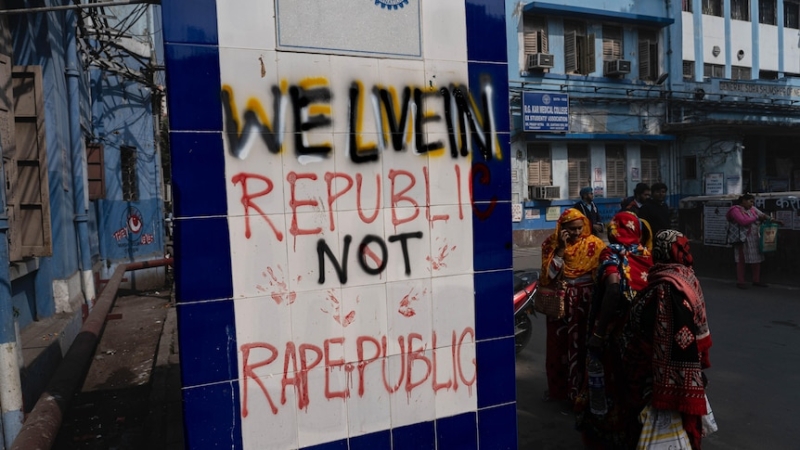Acid attacks could often be "very gendered attacks" and used as a form of "retaliation" against women. (ABC News: Illustration by Jarrod Fankhauser )
Read the story in Bahasa Indonesia
A university student was getting ready for church on Christmas Eve in Indonesia when a man snuck into her apartment to carry out an attack that would scar her for life.
As she stepped out of the shower with a towel around her torso, the man allegedly poured acid over her face and body.
"Then the victim screamed, screamed loudly, and the perpetrator immediately ran away," said Probo Satrio, the head of Yogyakarta Police's Criminal Investigation Department.
The brutal assault was among a spate of acid attacks in Indonesia in 2024, which included several committed by men against women.
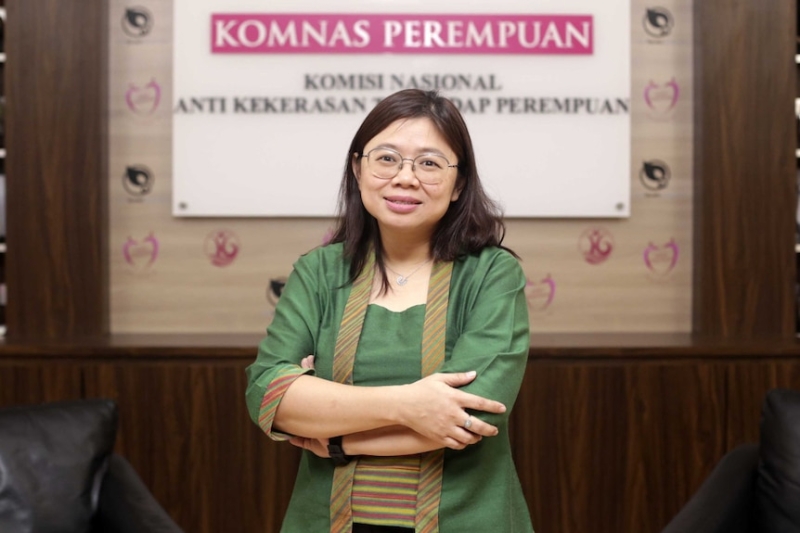
Andy Yentriyani says the government should help women acid attack survivors with related medical bills. (Foto: VIVA/M Ali Wafa)
Billy Vilsen, a master's student at a university in Yogyakarta, dated the woman for three years but "could not accept" the break-up in August 2024, police alleged.
He found the assailant, Satim, through a call-out on Facebook.
Reshma is a model, vlogger and acid attack survivor
Photo shows A woman with a scared face stands against a pink wall looking serious
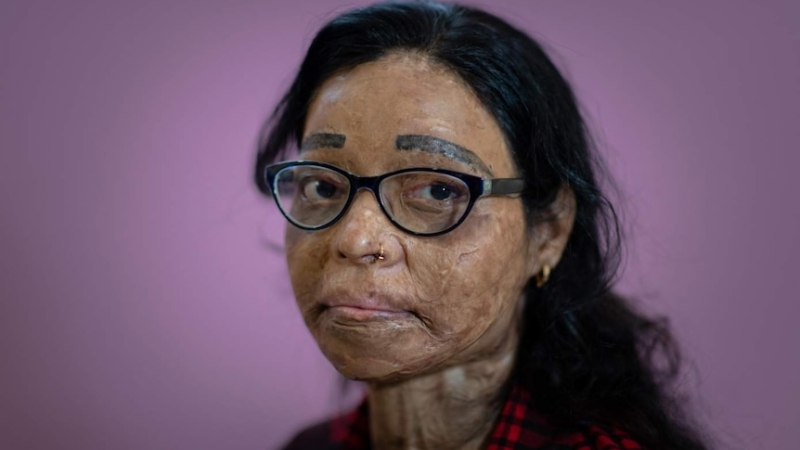
National Commission on Violence Against Women chairperson Andy Yentriyani said acid attacks could be "very gendered acts" and had often been used as a form of "retaliation" when relationships ended.
"[The men] know the usage of acid materials will disfigure the women and hence it will actually limit the opportunity of the woman to be in relation with other persons," said Ms Yentriyani.
She told the ABC the commission would launch a study to gather and review data on the attacks as a "first step" to address the problem.
Calls to support women with bills
Satim, who only goes by one name, had purchased one litre of acid from a chemical store with money from a 1.6 million rupiah ($159) "operational fund" Billy Vilsen had paid him, police alleged.
He was also allegedly promised 7 million rupiah ($695) if he successfully attacked the woman, who the ABC has decided not to name.
Family and domestic violence support services:
- 1800 Respect National Helpline: 1800 737 732
- Women's Crisis Line: 1800 811 811
- Men's Referral Service: 1300 766 491
- Mensline: 1300 789 978
- Lifeline (24-hour Crisis Line): 131 114
- Relationships Australia: 1300 364 277
Both men have been arrested and charged with aggravated assault under Indonesia's criminal code.
The recent attacks have also triggered concerns about the insufficient regulation on the sale of chemicals.
Prosperous Justice Party parliamentarian Surahman Hidayat, a member of a law enforcement committee, urged Indonesia's government to tighten regulations and better monitor the use and sale of chemicals that have been used in assaults.
Mr Hidayat said the acids are currently too cheap and accessible.
Indonesia acid attack
Photo shows Still image of Indonesian corruption investigator Novel Baswedan. His left eye was damaged in an acid attack.

While some experts welcomed the idea, they said it wouldn’t be very effective in preventing the attacks and chemicals could readily be purchased online.
Ms Yentriyani suggested the government could also help victim-survivors pay for expensive surgeries needed after acid assaults.
The woman who survived the acid attack on Christmas Eve suffered serious injuries to her body and will reportedly undergo plastic surgery and treatment for the next few months.
Acid attacks in India, Cambodia
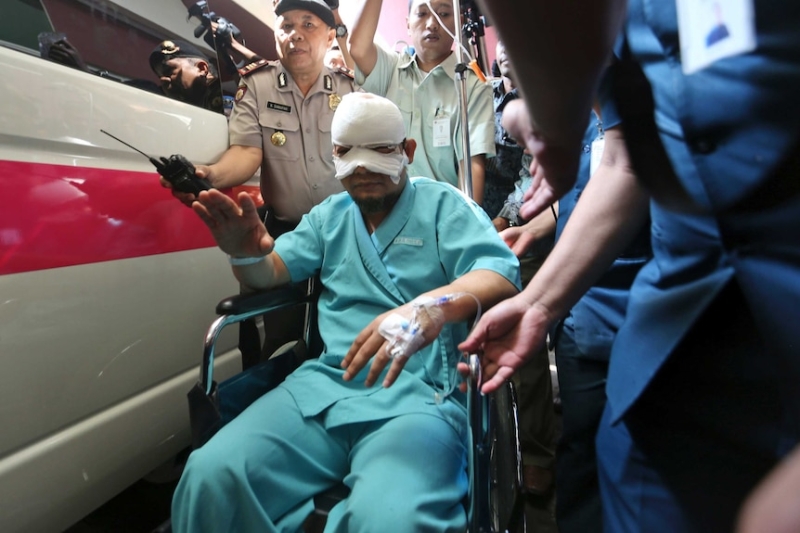
Novel Baswedan was an Indonesian Corruption Eradication Commission (KPK) investigator in 2017 when he was attacked with acid. (AP: Achmad Ibrahim)
Just days after the Yogyakarta incident, a separate acid attack in West Java left a 46-year-old woman and two of her children hospitalised.
Police alleged the woman's husband poured the chemical on her when "emotions peaked" during an argument.
Authorities said the husband accused his wife of having an affair and acted out of jealousy.
The attack also injured their 12-year-old and 18-year-old children as they tried to shield their mother, authorities alleged.
The man was arrested and charged with offences under Indonesian domestic violence law.
Cambodia acid attacks
Photo shows A woman lies in pink pyjamas on a hospital bed with her face wrapped in heavy bandages, a man lies on the next bed with bandages
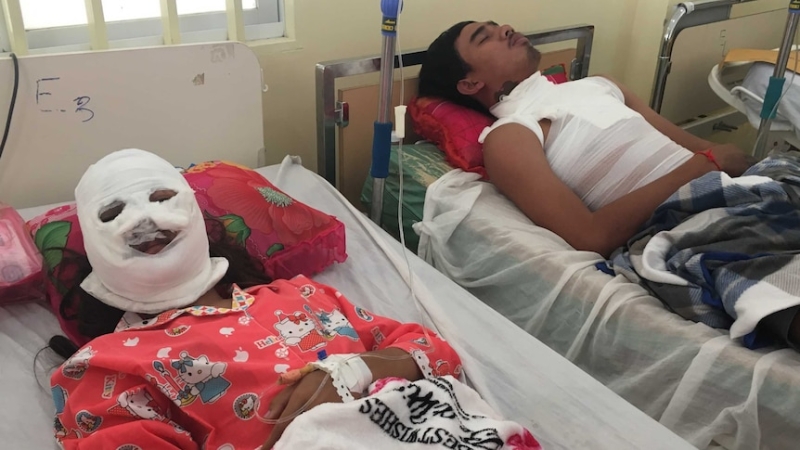
Incidents of men attacking women with acid have been documented in multiple countries across Asia, with experts labelling the assaults as a form of gendered violence.
A 2019 Human Rights Watch report on acid attacks in Cambodia included a reference to the "gendered aspect" of some assaults, while acid attacks on women in India were on the rise that same year.
There have also been some high-profile acid attacks on men.
In Indonesia in 2017, two men on a motorbike threw acid at Novel Baswedan, who at the time was an investigator for a corruption commission. The attack left him blind in one eye.
In 2024, a Malaysian footballer was critically injured after being splashed with acid.
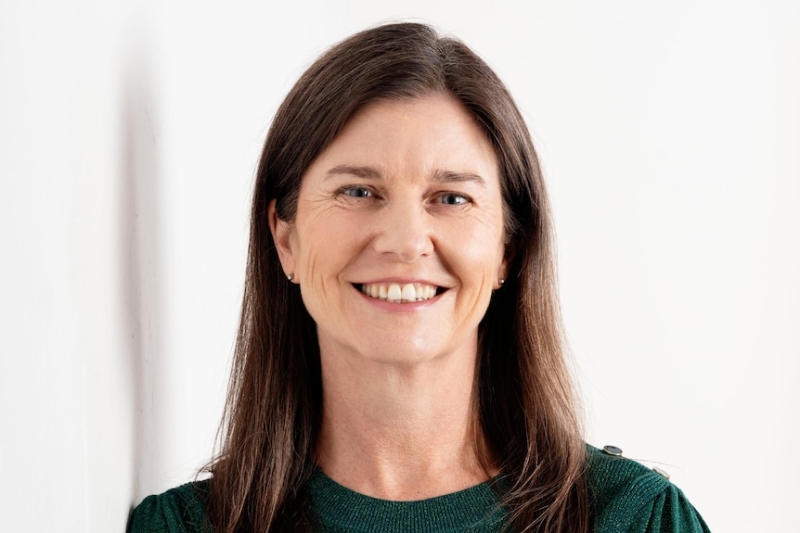
Dr Sharyn Davies says more needs to be done to reduce violence against women in Indonesia. (Supplied)
But Ms Yentriyani said the recent acid attacks were evidence of "intensifying violence against women in Indonesia".
While not wanting to "over-generalise", Ms Yentriyani said acid was often the weapon of choice when a man wanted to inflict permanent injuries on a woman with lasting impacts.
Physical scarring and damage to a woman's face and body meant she no longer fit within a certain "beauty paradigm" on how women should look, she added.
Ms Yentriyani said the study would aim to investigate the motivations behind the attacks, how they affected the daily lives of victim-survivors and potential interventions.
The results could be used to make policy recommendations to the Indonesian government, she added.
Better responses needed to stop violence
In 2024, 24,973 cases of violence against women were recorded by the Ministry of Women's Empowerment and Child Protection, while 6,217 cases of violence against men were documented in the same year.
Indonesia's passes landmark sexual violence bill
Photo shows Women hold up placards at a protest.
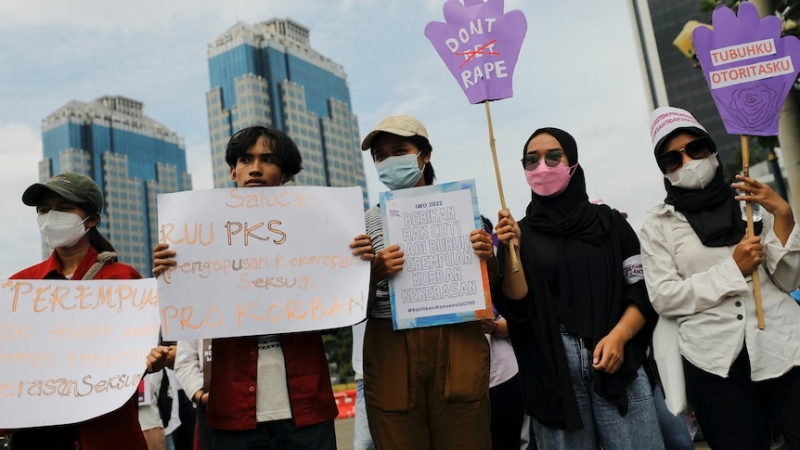
"Violence against women in Indonesia is driven by unchallenged patriarchal norms, legal gaps, weak law enforcement, and socio-economic reasons," said Sharyn Davies, an associate professor in Indonesian studies at Monash University.
Dr Davies said regulating chemical sales "wouldn't do much" and called for "better and earlier responses" from authorities to prevent violence against women.
Survivors faced stigma, inadequate support and systemic barriers to justice, she added, particularly in rural areas where services are scarce and traditional values are stronger.
"Addressing this requires comprehensive legal reforms, community engagement to challenge harmful norms, gender-sensitive training for law enforcement, and better access to support systems for survivors."
The Ministry of Women Empowerment and Child Protection has been contacted for comment.





